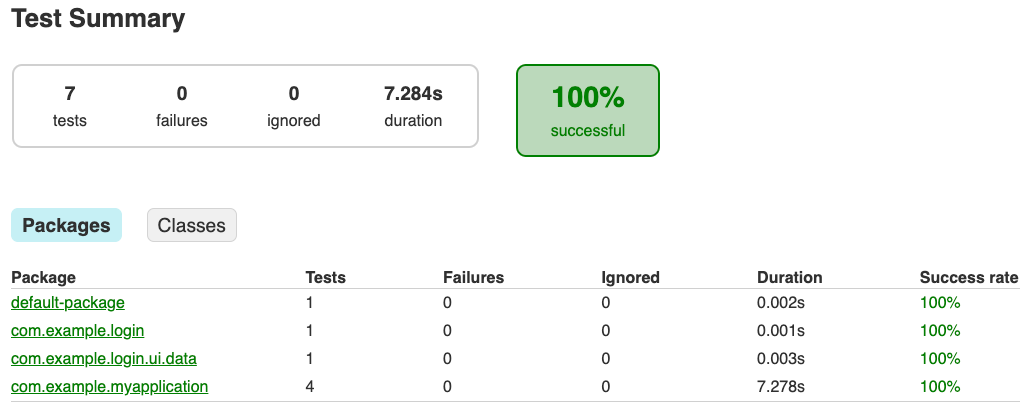This is an example project that illustrates how can the
JaCoCo Report Aggregation Plugin and
Test Report Aggregation Plugin
can be used to aggregate a complex Android project with JVM modules in a single :jacocoTestReport and :testAggregateTestReport tasks.
- An
appandroid module (with Robolectric tests) - A
loginandroid library module (with JUnit4/JVM tests) - A
domainjvm module (with tests) - A
coverage-pluginincluded build that provides thecoverageroot plugin
The plugin fills the gaps between AGP and JaCoCo Report Aggregation Plugin by providing the necessary setup missing:
- It applies
jacoco-report-aggregationandtest-report-aggregationat root project - Creates
jacocoTestReportandtestAggregateTestReportforTestSuiteType.UNIT_TEST - If a module applies
jacocoplugin, it adds it to thejacocoAggregationandtestReportAggregationroot configurations - If a module applies the
javaplugin, makes its childjacocoTestReporttask to depend ontest - If a module applies the
androidplugin:- it enables by default
BuildType.enableUnitTestCoverageondebugto produce jacoco exec files - adds the
codeCoverageExecutionData,codeCoverageSources,codeCoverageElements(classes) andtestResultsElementsoutgoing variants, to allowjacoco-report-aggregationandtest-report-aggregationto aggregate it
- it enables by default
Please note that JVM still need to manually apply jacoco plugin (this is an intentional opt-in behavior)
build.gradle.kts
The task :jacocoTestReport is added to the root project when applying this plugin and it can be
run to produce the report. All dependent test tasks will be run too to produce the required execution data.

The same for :testAggregateTestReport:

The easiest way to adopt this plugin, is to put the coverage.gradle.kts
on your buildSrc/src/main/kotlin folder.
Create the buildSrc project if missing and make sure to apply kotlin-dsl plugin on it
Don't forget its companion CoveragePluginDSL.kt file
This is an opt-in/out switch meant to be used when having productFlavors.
enableUnitTestCoverage is a BuildType setting (default on debug). When having flavors, you'll
have many coverage reports to produce targeting debug (one per flavor variant).
You can use enableUnitTestCoverage.set(false) to turn aggregation off for an specific ProductFlavor.
Basically, the variant won't be added to the codeCoverageExecutionData configuration, so :jacocoTestReport won't compute it
For instance, app module has a environment dimension with 2 flavors: stage and prod.
Without any extra settings, :jacocoTestReport will depend on :app:testStageDebugUnitTest and
:app:testProdDebugUnitTest (running its src/test/ tests effectively twice).
You may choose which flavors participates in the aggregated report by doing:
productFlavors {
create("stage") {
dimension = "environment"
}
create("prod") {
dimension = "environment"
aggregateTestCoverage.set(false)
}
}where it effectively only run :app:testStageDebugUnitTest